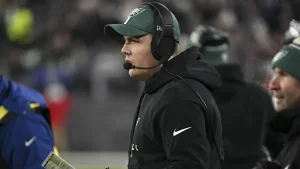
Former Tennessee Commit, Brandon Anderson Talks About Recruitment, Biggest Players
Brandon Anderson, a former commitment to the University of Tennessee, had quite an intriguing journey when it came to his recruitment and the players he considered to be the biggest influences along the way. His story is one of perseverance, careful decision-making, and reflection on the process that led him to where he is now. Whether it’s the path he took with Tennessee, his perspective on other players he encountered during his recruitment, or the wisdom he has gained through his experiences, Anderson has quite a lot to say.
Anderson was initially attracted to Tennessee due to its rich football tradition, passionate fanbase, and proximity to his home. His commitment to the Volunteers was a decision driven by a deep sense of connection to the program and the state. However, as with many young athletes navigating the college football recruitment process, Anderson’s decision-making didn’t stay static. The long and winding road of recruitment is rarely straightforward, and Anderson’s journey was no exception.
The Tennessee Commitment
When Anderson initially committed to Tennessee, it was considered a huge win for the program. The Volunteers had been working hard to rebuild their roster and strengthen their recruiting efforts, and landing a top recruit like Anderson sent a clear signal of their renewed prominence in the recruiting game. For Anderson, it wasn’t just about football. He felt a connection to the university, its coaches, and the energy surrounding the program. He was surrounded by family, friends, and mentors who saw Tennessee as a place where he could thrive.
The Volunteers’ coaching staff, led by their head coach at the time, were instrumental in Anderson’s decision to commit. Their approach was engaging and personal, providing Anderson with the sense that he could make an immediate impact on the program. It was clear to him that Tennessee was serious about his development not just as a player, but as a young man. The prospect of playing in front of thousands of fans every week was also an attractive draw. Anderson knew that the atmosphere at Neyland Stadium would be unlike any other, and that the experience of being a part of that tradition would be something to cherish for the rest of his life.
But as time passed, Anderson began to reconsider his commitment. Recruitment is a complex process, and sometimes a player’s priorities evolve as they gain more information. Anderson started to feel that there might be other programs that offered better fit for his long-term goals. He wasn’t sure if Tennessee was the right place for him after all.
Shifting Perspectives
As Anderson continued his recruitment journey, he was exposed to other universities that offered different cultures, environments, and opportunities. One of the most pivotal aspects of his recruitment was how he felt when visiting various campuses. It wasn’t just about the football program; it was about finding a place where he could truly see himself succeeding academically, socially, and as an athlete.
Anderson’s perspective on recruiting shifted as he learned more about what other schools had to offer. It wasn’t just about being wooed by fancy facilities or the reputation of the coaching staff; he began to think more deeply about the type of environment where he could flourish. The pressure of making such a life-changing decision also took its toll on him as he faced the reality of competing at the highest level.
During his visits to schools like Alabama, Georgia, and LSU, Anderson realized that each program brought something unique to the table. Alabama’s history of success and elite coaching staff were hard to ignore, while Georgia’s impressive recruiting class and family-like atmosphere also stood out. LSU, with its fervent fanbase and consistent competitive edge, felt like another place where Anderson could grow and develop. Each program had its own reasons for being attractive, but Anderson struggled with the notion of where he truly belonged.
Looking Back: Biggest Players in Recruitment
When asked about the biggest players in recruitment, Anderson is quick to acknowledge the impact of not only coaches but also his family and peers. The people surrounding him during the recruitment process played an immense role in shaping his decisions and guiding him along the way.
One of the most influential figures was Anderson’s father. His father had always emphasized the importance of making a decision that was grounded in long-term happiness and personal growth, rather than just short-term excitement or pressure from the outside world. His father’s calm approach and ability to provide perspective were essential for Anderson as he faced the overwhelming task of selecting a school.
Beyond his family, Anderson also leaned heavily on his high school coaches and mentors. They were instrumental in providing him with the wisdom to handle the pressures of recruitment. They taught him how to handle the emotional rollercoaster that often comes with the process, and they helped him focus on the things that really mattered: his development as a player, his personal happiness, and the legacy he hoped to create.
Peers also played a critical role in shaping Anderson’s views on recruitment. He had the privilege of training and competing with some of the top high school athletes in the country, and seeing their experiences helped him realize the magnitude of the decision. He understood that many of these athletes faced similar challenges and decisions and that the journey was not always as glamorous as it seemed. This helped him remain grounded and not rush into a decision.
The Impact of Social Media
One of the most interesting aspects of Anderson’s recruitment process was the role social media played. In an era where athletes can reach millions of people with the click of a button, social media has become both a blessing and a curse. Anderson, like many other athletes, found himself balancing the positive aspects of social media attention with the challenges it presented.
On the one hand, social media gave him a platform to connect with coaches, fellow recruits, and fans. It was a way to engage with the world beyond his high school field and to receive validation and encouragement from people who believed in his potential. Anderson used social media to share his journey and experiences with his followers, but he also had to be cautious about the messages he received. Recruiting can be an intense process, and there were certainly moments when the public eye felt overwhelming.
In some ways, Anderson had to filter out the noise. He learned that social media often painted an unrealistic picture of what recruitment was like. People would comment on his decisions, offer unsolicited advice, and pressure him to commit to certain schools. In the end, Anderson found that the opinions of people who truly knew him and cared about his best interests were the ones that mattered most.
The Decision: A New Path Forward
After much thought and deliberation, Anderson ultimately decided to decommit from Tennessee and explore his options further. It wasn’t an easy decision, as he had a strong bond with the Tennessee coaching staff and the school itself. But in the end, he felt that a different program aligned better with his goals and aspirations.
One of the factors that helped solidify his decision was the understanding that, ultimately, the college football experience is about personal growth. Anderson wanted a place where he could maximize his potential and have the support system to thrive academically and athletically. It wasn’t just about football; it was about setting himself up for life after the game.
In choosing a new program, Anderson didn’t take his decision lightly. He spent time evaluating each school not just for its football program, but for the educational opportunities, the culture of the athletic department, and the overall atmosphere of the campus. For him, this was about creating a legacy that would last far beyond his playing days.
Reflection on the Recruitment Process
Looking back on the recruitment process, Anderson has a wealth of insights. He learned that recruitment is about finding the right fit, not just picking the most high-profile program. It’s about understanding that there is no one-size-fits-all answer and that the experience is unique for every athlete.
For young athletes going through the recruitment process, Anderson offers some valuable advice. First, he stresses the importance of trusting one’s own instincts and not rushing the decision. With the pressure to commit quickly, it’s easy to forget that this is a life-changing choice. He also advises athletes to keep their family and trusted mentors close, as they will offer perspectives that can help navigate the challenges.
In addition, Anderson encourages athletes to take a step back and look beyond the football field. College is a time for personal growth, and it’s crucial to consider the entire student-athlete experience. Football can be a short-lived career, but the relationships, education, and personal development that come with attending college will last a lifetime.
As Brandon Anderson reflects on his recruitment journey, it’s clear that he has emerged from the process more mature, more thoughtful, and more prepared for whatever lies ahead. His path wasn’t without challenges, but each experience has contributed to shaping the person he is today. And though the road ahead may still be full of uncertainties, Anderson is ready to face them head-on.





